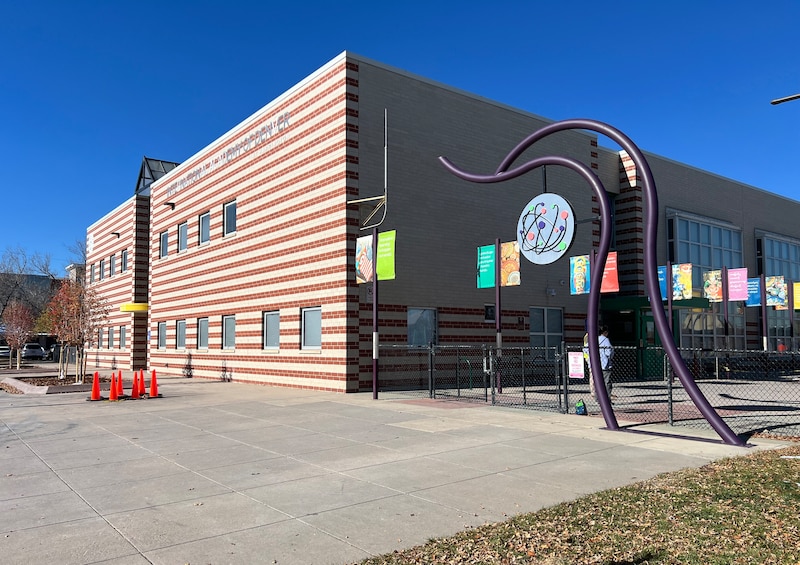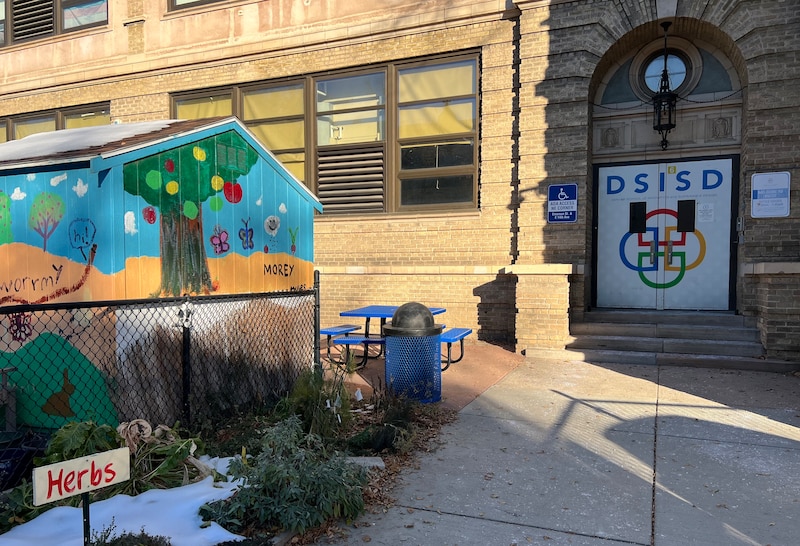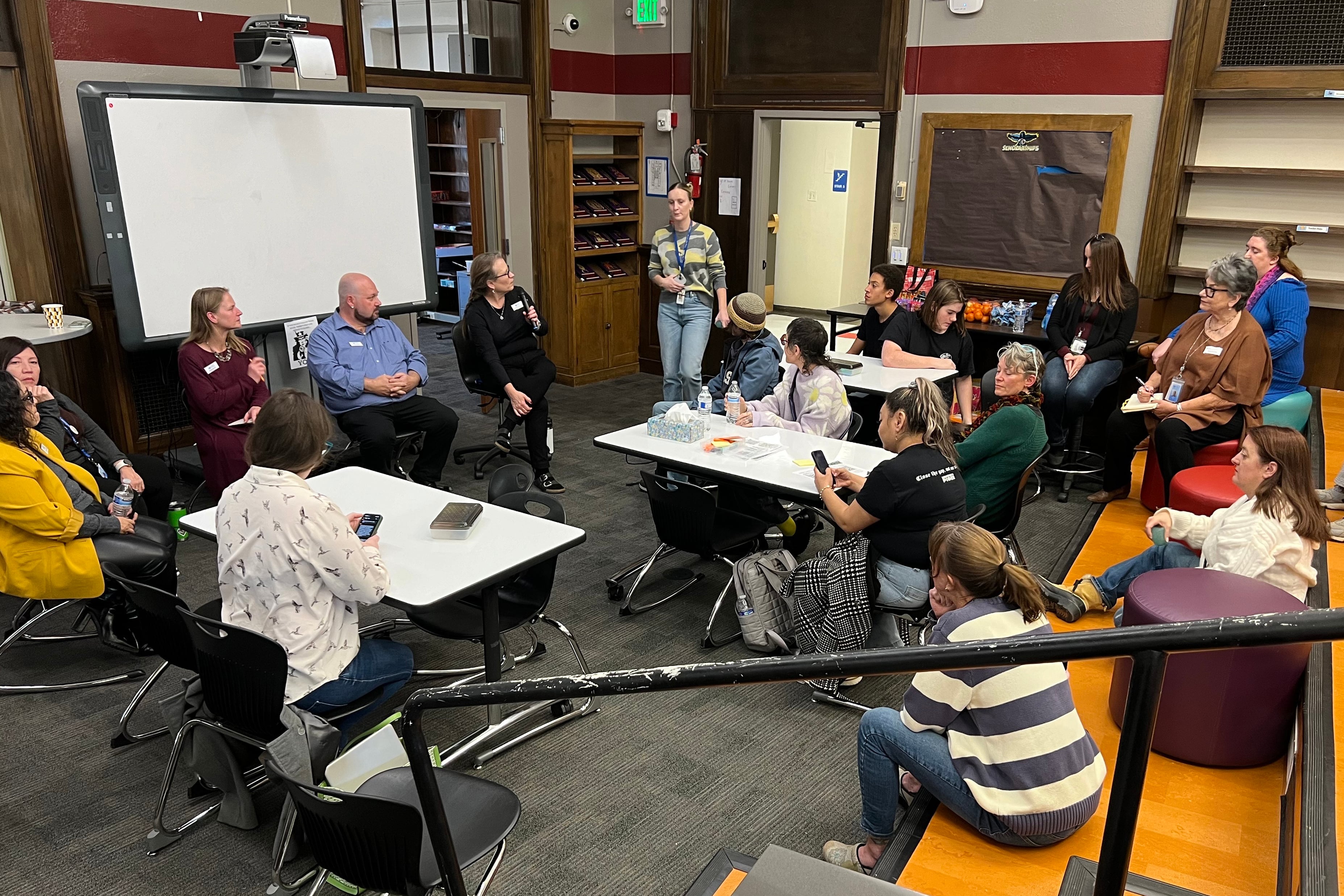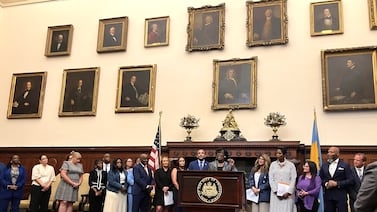Sign up for Chalkbeat Colorado’s free daily newsletter to get the latest reporting from us, plus curated news from other Colorado outlets, delivered to your inbox.
In school libraries and cavernous auditoriums, the Denver school board on Monday began a week of listening to students, parents, and teachers in 10 schools facing possible closure.
What they heard was emotional at times.
“This is the first school I’ve ever been in where I have not seen a single instance of bullying,” Robin Yokel, an English language arts teacher at Denver School of Innovation and Sustainable Design, told board members.
“It is heartbreaking to see us continue to put lip service toward ‘students first’ and make choices that are not students first — they are finances first. Our students deserve better than that.”
Superintendent Alex Marrero last week recommended closing 10 schools to address declining enrollment in Denver Public Schools. The school board is set to vote Nov. 21 on whether to follow through with the closures.
Denver School of Innovation and Sustainable Design, International Academy of Denver at Harrington, Castro Elementary, Columbian Elementary, Palmer Elementary, Schmitt Elementary, and West Middle School are up for closure.
Kunsmiller Creative Arts Academy, Dora Moore ECE-8 School, and Denver Center for International Studies would be partially closed if the board votes yes.
The school meetings Monday stood in contrast to meetings held two years ago, the last time Marrero recommended closing 10 schools — a proposal the school board rejected in part due to poor community engagement. The meetings in 2022 were run by mid-level district administrators. Last-minute scheduling and overlapping meetings meant school board members were sometimes there and sometimes not. Parents’ questions were often met with “I don’t know.”
The engagement this time is similarly short, with just two weeks between Marrero’s recommendation and the board’s vote, drawing familiar criticism about a rushed process. But district officials described the process as improved.
The board plans to visit two schools per day over five days, accompanied by top administrators. Each school will have four meeting times: one in the morning during student dropoff, one over the lunch hour, one in the afternoon during pickup, and an evening public comment session.
Yet despite more robust planning, some of the sessions Monday were sparsely attended.

The board visited International Academy of Denver at Harrington, an elementary school in near northeast Denver, and DSISD, as it’s known, a high school in the central part of the city. The level of engagement differed at each school. It’s a trend that will likely continue this week as some school communities mobilize to fight back, while others, resigned, look toward next steps.
DSISD is the smallest school on the closure list with just 60 students. Dozens of parents, students, and teachers described it as “the best kept secret in DPS,” “a once-in-a-lifetime school,” and a safe haven for LGBTQ and neurodiverse students.
“The amount of bullying that my child and many others have faced in a regular DPS school is heartbreaking,” parent Susan Klopman told board members gathered in the school’s library, her voice wavering as she began to cry, “and it’s not happened here.”
She and others said they understand that it’s hard for the district to keep a school open with so few students, especially since Denver funds its schools per pupil and backfills the budgets of schools with low enrollment. But they questioned whether the monetary savings of closing DSISD, which is located inside another school that will remain open, is worth the human cost.
“Some of us just literally won’t make it in larger schools,” said freshman Owen Bucca.

Over the lunch hour at Harrington, more than a dozen teachers filtered in and out of the bright school library, where three board members sat waiting for them.
The teachers asked why their school was chosen for closure. Harrington, they said, does an excellent job serving a high-priority population. Fifteen percent of the students are Black, 70% are Latino, and nearly half are learning English as a second language.
Based on its state test scores, Harrington is rated yellow, or “improvement,” which is higher than some of the surrounding elementary schools. It was also an early adopter of “science of reading” literacy curriculum that the district is only now rolling out to other schools.
“These students are thriving,” said fifth grade teacher Kristen Smith, who has taught at Harrington for 10 years. “Is it worth it to allow them to have a small school?”
The board members’ answer was financial. When Denver schools have fewer than 215 students, the district helps pay for the basics. At 122 students, Harrington is one of those schools, receiving more than $600,000 in additional funding this year, according to district data. (DSISD received about $868,000. DPS’s total budget is about $1.5 billion.)
That money, board member Michelle Quattlebaum told the teachers, “has to come from somewhere.” For the past few years, federal pandemic relief funds, known as ESSER dollars, helped buoy the district’s budget. But that funding dried up in September.
“There are not enough students in the building to sustain what you’re doing here,” Quattlebaum said. “For the past few years, to make that happen, your school leader had to apply for budget assistance. Guess where it came from? ESSER dollars. Guess what we no longer have? ESSER dollars.”
She added, “It’s not fair. And if I can just be honest, it just sucks. These are hard conversations. They’re hard and difficult things to experience. But please know — please, please know — this is not just about the numbers. We recognize this is impacting people.”
While board members said the morning session at Harrington was better attended, no one from the school came to the afternoon meeting. The only person who signed up to speak at the evening public comment was a parent from another school.
The board will hold a larger public comment meeting on all of the recommended closures on Nov. 18, three days before the vote.
Melanie Asmar is the bureau chief for Chalkbeat Colorado. Contact Melanie at masmar@chalkbeat.org.






